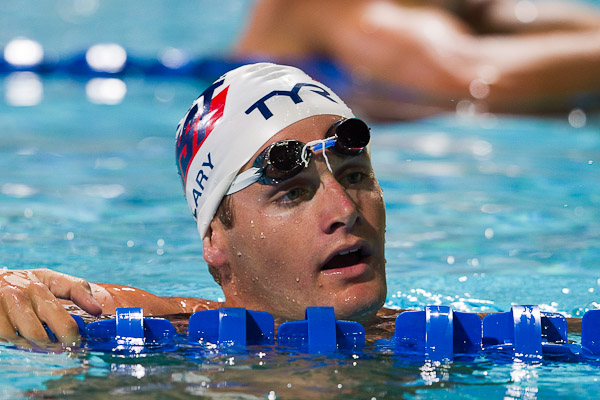Posted by Glenn Mills on Dec 29, 2010 06:00AM (0 views)
This article is meant for competitive swimmers who have expressed their desire to be great at this sport. This does not apply to everyone and I don't mean it to. I do NOT carry this level of intensity with me anymore in my swimming, and only wish it on those who do choose it.
I've toyed with writing this article for a few years. I've always been a bit in amazement by people who feel attitude at a specific time will get them through a situation against someone who has been preparing for years.
Like the short video above, which is obviously a friendly competition to highlight the great talent by the smaller, and seemingly younger wrestler, no talk in the world, or intimidation could possibly get the larger athlete through this competition. In a skill sport, no matter how "intense" he decided to get, talent and preparation will always overcome someone who talks a good game.
Swimming, unfortunately for people who choose when to be intense, is a skill sport. It's a sport in which the technique you use is as, if not much more important than the fitness level you achieve. Simply put, could you imagine a competition in which average people show up at a pool, and get to race even former Olympic swimmers? You can usually tell someone who's achieved a certain amount of mastery in swimming by watching them for just a couple strokes. You can also usually tell someone who is still in the developmental stages of swimming. The thing that stands between them... years of preparation.
If you've decided that swimming is your sport, then you're going to have to also decide on your level of intensity. Trash talking doesn't exist in our sport, and usually when it does, it has a history of playing against the trash talker. No matter the level of respect that comes after the fact, trash talking hasn't been very successful in the sport of swimming. The Americans telling the Australians how he was going to beat them in the 2000 Olympics only fueled the fire of the opponents and helped them win. Just as the French team telling the American's in 2008 how they were going to smash them, helped create one of the most exciting and memorable races in the history of the sport. How foolish do people feel when they talk a good game, then fail.
I'm also not saying there's really anything wrong with an Olympic Silver medal. Are you kidding me? I'd take one, and those athlete's who have earned them have prepared incredibly, and if for only an instant, a mistake, or an strategical error, the would also be Olympic Champions. Those are just two very striking examples of trash talking in swimming.
What bothers me the most if the trash talking that takes place at the beginning and at the end of the season. Everybody seems to be intense when it matters most. The beginning of the season, especially in the goal setting meetings, there is talk of heroic feats to come at the end of the season. The visions of holding the hands high in victory at State Championships, Junior Nationals, and even higher... everybody is a champion at the BEGINNING of the season. The same happens during taper. Those that are of this persuasion seem to think that a few sprints, or NOW focusing on starts and turns will turn everything around... and their personal TOUGHNESS will prevail. It's only on the last length of a hard fought race, when there's simply nothing left and the competition is leaving them in the dust, does reality set in. No amount of tough talk, or "pocket intensity" is going to will something great to happen.
Greatness comes with constant intensity. The intensity that isn't glamorous. The intensity that reaches over to the alarm clock at 4:55 am to shut it off and climb out of bed. The intensity to work an IM set when you're a sprint freestyler. The intensity to push off in streamline and do 3 or 4 dolphin kicks off each wall in practice.
This type of intensity isn't what people like to talk about. This type of intensity carries with it more of a feeling of drudgery than the screaming american gladiator. This type of intensity is usually lonely, hard, and extremely waring on the psyche of the individual who practices it. It doesn't come with woots and hollars and fist pumping in the middle of practice. It normally comes with gasping for air in the :03 seconds of rest between intervals, or the soreness of muscles day in and day out.
I heard a great quote the other day that works well here. "You can't build a reputation on what you're going to do." - Henry Ford
My advice as a former athlete. Stop talking a good game, and get IN the game. Preparation and intensity isn't just about yardage and fast swimming. Intensity means showing up on time, completing a practice with integrity, not cheating, and trying to get something out of every length you swim.
If you don't carry that level of intensity with you on a daily basis, good luck pulling intensity out of your pocket at the end of the season.
Hope that works out for ya. ;)




